NCPR Documents
Posted in Uncategorised
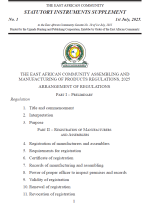
EAC Assembling and Manufacturing of Products Regulations, 2025
DownloadShall come into force on the 1st day of July, 2026.
Category: Customs, Regulations
Type: Rules & Regulations
Tag: Customs Union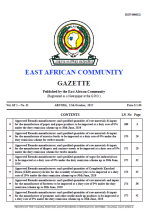
EAC Gazette | 15 October 2025
DownloadEAC Gazette | Vol. AT 1 – No. 31 | 15 October 2025
Category: Customs, Gazette
Type: Gazette
Tag: Customs Union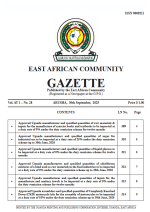
EAC Gazette | 30 September 2025
DownloadEAC Gazette | Vol. AT 1 – No. 28 | 30 September 2025
Category: Customs, Gazette
Type: Gazette
Tag: Customs Union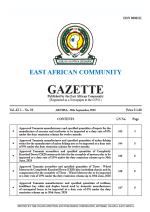
EAC Gazette | 30 September 2025
DownloadEAC Gazette | Vol. AT 1 – No. 29 | 30 September 2025
Category: Customs, Gazette
Type: Gazette
Tag: Customs Union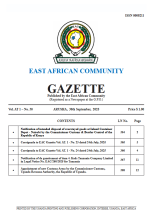
EAC Gazette | 30 September 2025
DownloadEAC Gazette | Vol. AT 1 – No. 30 | 30 September 2025
Category: Customs, Gazette
Type: Gazette
Tag: Customs Union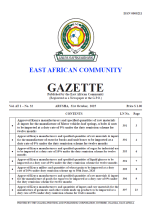
EAC Gazette | 31 October 2025
DownloadEAC Gazette | Vol. AT 1 – No. 32 | 31 October 2025
Category: Customs, Gazette
Type: Gazette
Tag: Customs Union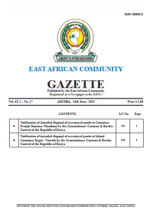
EAC Gazette | 13 June 2025
DownloadEAC Gazette | Vol. AT 1 – No. 17 | 13 June 2025
Category: Customs, Gazette
Type: Gazette
Tag: Customs Union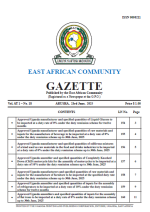
EAC Gazette | 23 June 2025
DownloadEAC Gazette | Vol. AT 1 – No. 18 | 23 June 2025
Category: Customs, Gazette
Type: Gazette
Tag: Customs Union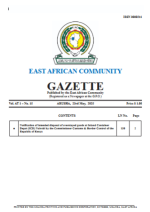
EAC Gazette | 23 May 2025
DownloadEAC Gazette | Vol. AT 1 – No. 15 | 23 May 2025
Category: Customs, Gazette
Type: Gazette
Tag: Customs Union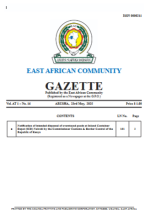
EAC Gazette | 23 May 2025
DownloadEAC Gazette | Vol. AT 1 – No. 16 | 23 May 2025
Category: Customs, Gazette
Type: Gazette
Tag: Customs Union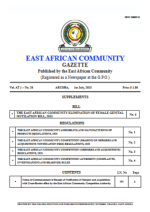
EAC Gazette | 01 July 2025
DownloadEAC Gazette | Vol. AT 1 – No. 20 | 01 July 2025
Category: Customs, Gazette
Type: Gazette
Tag: Customs Union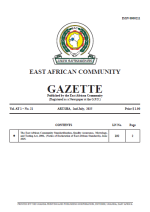
EAC Gazette | 02 July 2025
DownloadEAC Gazette | Vol. AT 1 – No. 21 | 02 July 2025
Category: Customs, Trade, Gazette, Standards, Quality Assurance, Metrology and Testing (SQMT)
Type: Gazette
Tag: Standards, Trade Standards, SQMT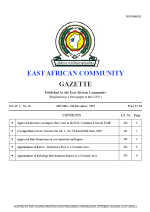
EAC Gazette | 08 December 2025
DownloadEAC Gazette | Vol. AT 1 – No. 36 | 08 December 2025
Category: Customs, Gazette
Type: Gazette
Tag: Customs Union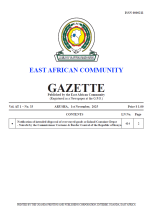
EAC Gazette | 1 November 2025
DownloadEAC Gazette | Vol. AT 1 – No. 33 | 1 November 2025
Category: Customs, Gazette
Type: Gazette
Tag: Customs Union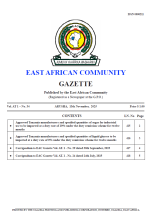
EAC Gazette | 13 November 2025
DownloadEAC Gazette | Vol. AT 1 – No. 34 | 13 November 2025
Category: Customs, Gazette
Type: Gazette
Tag: Customs Union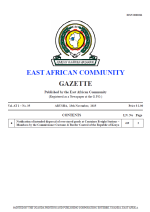
EAC Gazette | 13 November 2025
DownloadEAC Gazette | Vol. AT 1 – No. 35 | 13 November 2025
Category: Customs, Gazette
Type: Gazette
Tag: Customs Union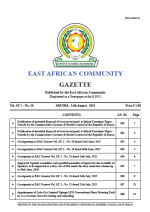
EAC Gazette | 14 August 2025
DownloadEAC Gazette | Vol. AT 1 – No. 26 | 14 August 2025
Category: Customs, Gazette
Type: Gazette
Tag: Customs Union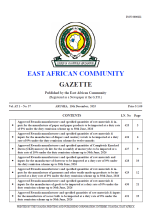
EAC Gazette | 15 December 2025
DownloadEAC Gazette | Vol. AT 1 – No. 37 | 15 December 2025
Category: Customs, Gazette
Type: Gazette
Tag: Customs Union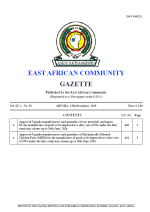
EAC Gazette | 15 December 2025
DownloadEAC Gazette | Vol. AT 1 – No. 38 | 15 December 2025
Category: Customs, Gazette
Type: Gazette
Tag: Customs Union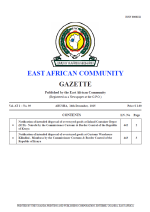
EAC Gazette | 16 December 2025
DownloadEAC Gazette | Vol. AT 1 – No. 39 | 16 December 2025
Category: Customs, Gazette
Type: Gazette
Tag: Customs Union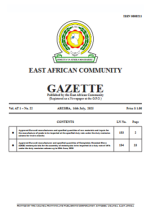
EAC Gazette | 16 July 2025
DownloadEAC Gazette | Vol. AT 1 – No. 22 | 16 July 2025
Category: Customs, Gazette
Type: Gazette
Tag: Customs Union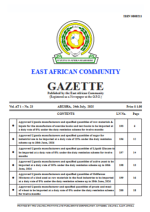
EAC Gazette | 24 July 2025
DownloadEAC Gazette | Vol. AT 1 – No. 23 | 24 July 2025
Category: Customs, Gazette
Type: Gazette
Tag: Customs Union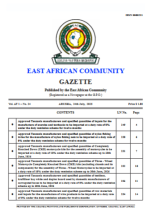
EAC Gazette | 24 July 2025
DownloadEAC Gazette | Vol. AT 1 – No. 24 | 24 July 2025
Category: Customs, Gazette
Type: Gazette
Tag: Customs Union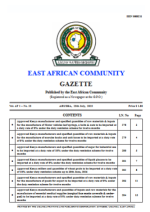
EAC Gazette | 25 July 2025
DownloadEAC Gazette | Vol. AT 1 – No. 25 | 25 July 2025
Category: Customs, Gazette
Type: Gazette
Tag: Customs Union
EAC Gazette | 30 June 2025
DownloadEAC Gazette | Vol. AT 1 – No. 19 | 30 June 2025
Category: Customs, Gazette
Type: Gazette
Tag: Customs Union
